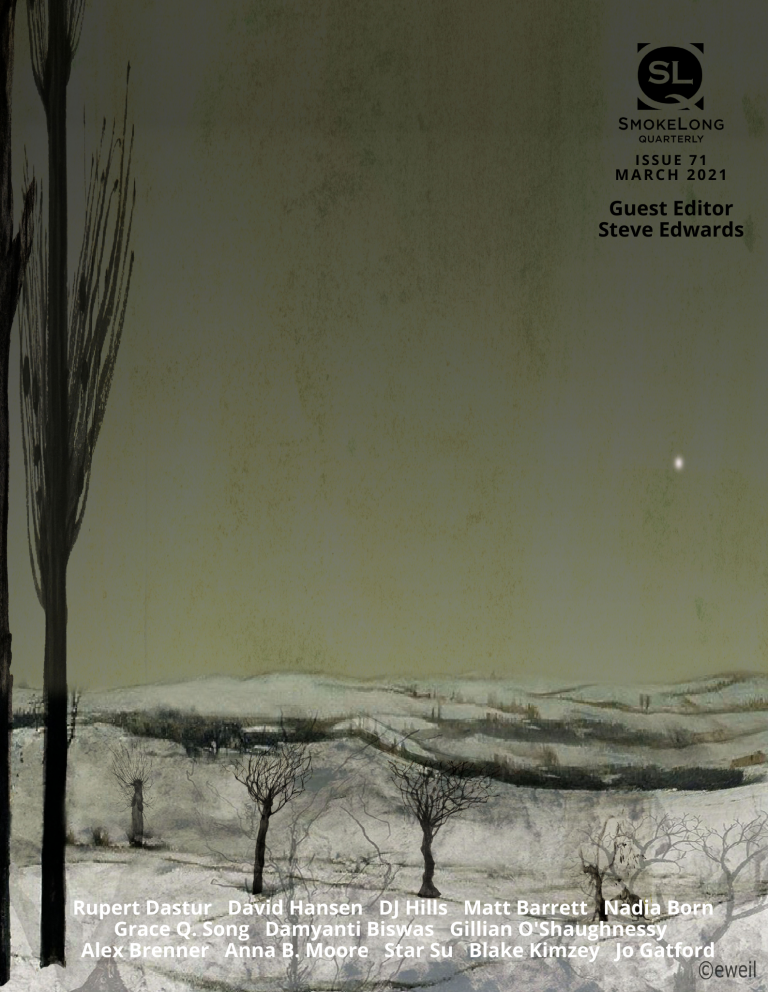“Checking for Ticks” leaves me with an understanding of how obsession, grief, and concern can manifest in actions, in relationships. Theo seems to be a character inhabited by the loss (or near loss) of his sister. Can you talk a little about how you capture the complexities of those emotions through characterization of Theo and in so few words?
I grew up in the Midwest and some of my first memories are pairs of hands checking for ticks in my hair. It’s such a tender, physical act of love. And if a tick is found, there’s an immediate sense of being saved. As the tick checker, Theo feels that responsibility—even obsession—to save after what happened to his sister. I think he’s best characterized by this simple action as he seeks the physical comfort of preventing loss from reoccurring.
The piece is achieved through bursts of images and scene. There’s zero interjection from the narrator about how to interpret those things. There’s no dialogue. Do you craft most [flash] pieces in that way?
Interesting question. My work is often born out of image, so I do think I lean on detail and mood while drafting. But it depends. I think the characters here are relying on tactile expression, so it’s natural they’re rather quiet. I’ve written other pieces with characters who are much “chattier” (internally and externally), though I admit image often takes on significant lyrical weight for me no matter what.
Endings are so important and can be difficult to get right. The ending in “Checking for Ticks” is quiet and shifts from the moment in the foxtails to a metaphor of a spinning globe. Can you describe how you decided on the last sentence? Were there other iterations of the ending? When did the ending feel right to you?
There were other iterations of the ending, but I kept coming back to the line of the spinning globe. First of all, I wanted to put a magnifying glass to this small act of love—of checking for ticks. But I also liked the fragility of this line: the sense that our lives are threatened every day by things big and small, yet we carry on. The world keeps spinning, so to speak.
When writing flash, do you find yourself starting with a longer draft and cutting away excess, or do you have a pretty clear conception of what a piece will be from the get-go?
I’m a chronic long drafter. I like exhausting everything in my brain surrounding a concept and then I’ll go back and see what sticks. I’ll confess that the first draft for “Checking for Ticks” was three times as long.
Where do you go to read new flash work? Which literary journals and/or writers are you reading for inspiration?
SmokeLong Quarterly, Passages North, Wigleaf, and Fractured Lit are my favorites. I’m also a fan of Cincinnati Review’s MiCRo series because of all the flash in translation they publish.



 The core workshop of SmokeLong Fitness is all in writing, so you can take part from anywhere at anytime. We are excited about creating a supportive, consistent and structured environment for flash writers to work on their craft in a community. We are thrilled and proud to say that our workshop participants have won, placed, or been listed in every major flash competition. Community works.
The core workshop of SmokeLong Fitness is all in writing, so you can take part from anywhere at anytime. We are excited about creating a supportive, consistent and structured environment for flash writers to work on their craft in a community. We are thrilled and proud to say that our workshop participants have won, placed, or been listed in every major flash competition. Community works.